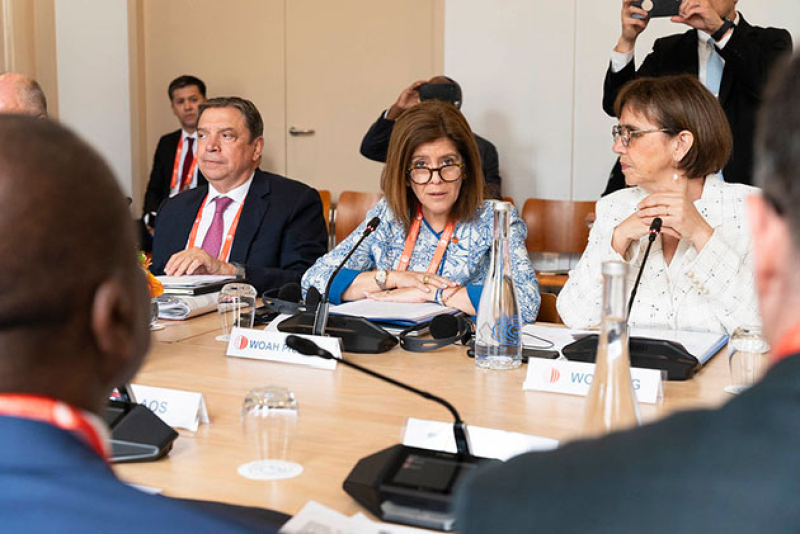- India Sees 9% Drop in Foreign Tourists as Bangladesh Visits Plunge |
- Dhaka Urges Restraint in Pakistan-Afghan War |
- Guterres Urges Action on Safe Migration Pact |
- OpenAI Raises $110B in Amazon-Led Funding |
- Puppet show enchants Children as Boi Mela comes alive on day 2 |
Animal Vaccines Key to Preventing Future Pandemics

Dr Susana Pombo addresses the WOAH General Session in May.
Just five years after the COVID-19 pandemic, another animal-borne disease is mutating and spreading across borders and species.
Avian influenza has already caused the loss of more than 630 million birds over the last 20 years. New data from the inaugural State of the World’s Animal Health report reveals that the number of reported outbreaks in mammals—including cattle, sheep, and cats—doubled last year compared to 2023.
While the risk of human infection from avian flu remains low, the more mammal species that become infected, the greater the risk of the virus adapting to mammal-to-mammal—and potentially human—transmission. Recent history has shown just how devastating and disruptive a zoonotic pandemic can be.
Following the adoption of a new pandemic accord by the World Health Organization (WHO) at the 78th World Health Assembly, the global community must remember that animal vaccines are among the most powerful tools to prevent zoonotic disease outbreaks, alongside other control measures.
Currently, many countries hesitate to include vaccination in their avian flu control strategies due to concerns over trade, livelihoods, and food security. Since it is difficult to distinguish between vaccinated and infected birds, widespread vaccination could trigger trade restrictions.
However, controlling avian flu in poultry can prevent its spread to other animals and humans. Vaccination can play an effective role when integrated carefully with other measures.
For example, the Toulouse Veterinary School projected up to 700 avian flu outbreaks in France in 2023. Yet, according to the French Chief Veterinary Officer, a nationwide duck vaccination campaign limited outbreaks to just 10. Key to this success was transparency and dialogue: the French authorities engaged regularly with scientists, veterinarians, farmers, and trading partners through the French Agency for Food, Environmental and Occupational Health and Safety (ANSES).
To expand the use of animal vaccination in flu control strategies and avoid another pandemic, governments and global agencies must overcome locally specific barriers that also hinder vaccination against other animal diseases.
First, governments must recognize animal health as an integral part of global health and promote international cooperation for disease monitoring, data sharing, early warning systems, and harmonized vaccination strategies.
The more authorities know about disease spread, the greater their chances of containing it. Reaching agreements with trade partners on outbreak-specific vaccination or targeting wild animals as disease reservoirs can help mitigate impacts on exports.
Second, the livestock sector would benefit from improved diagnostics that can distinguish between vaccinated and infected animals. This is known as the DIVA principle (Differentiating Infected from Vaccinated Animals) and is key to effective disease tracking and maintaining trade transparency. However, it requires greater investment and public-private collaboration.
Lastly, increased investment is urgently needed in vaccine deployment, biosecurity, hygiene protocols, and disease prevention. Veterinary professionals require ongoing education and field training, as well as robust infrastructure, to deliver vaccines effectively and manage diseases at the grassroots level.
The return on investment in disease control spans public health, agriculture, trade, and food security.
If COVID-19 taught the world anything, it’s that global health is an interconnected system—including humans, animals, and the environment.
Tackling animal diseases through vaccination, biosecurity, and innovation is not only essential for animals but also for preventing future pandemics in humans. Like COVID-19, it demands global collaboration, innovation, and sustained investment.
Dr. Susana Pombo is President of the World Organisation for Animal Health’s Council.

